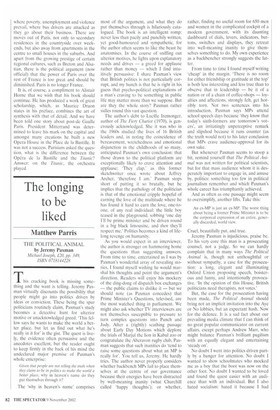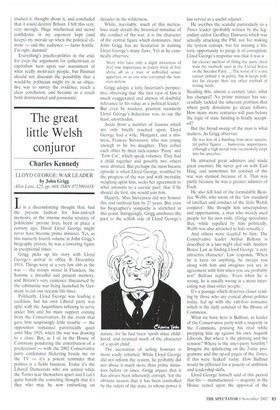The longing to be liked
Matthew Parris
THE POLITICAL ANIMAL by Jeremy Paxman Michael Joseph, £20, pp. 349, ISBN 0718144228 This cracking book is missing something and the want is telling. Jeremy Paxman virtually discounts the possibility that people might go into politics driven by ideas or conviction. These being the spur politicians routinely claim, Paxman's study becomes a detective hunt for ulterior motive or unacknowledged greed. 'This fellow says he wants to make the world a better place, but let us find out what he's really in it for' is the gist. The quest is lively, the evidence often persuasive and the anecdotes excellent, but the reader ought to keep firmly in the back of his mind the undeclared major premise of Paxman's whole enterprise: Given that people are not telling the truth when they claim to he in politics to make the world a better place, why in heaven's name do they put themselves through it?
The 'why in heaven's name' comprises most of the argument, and what they do put themselves through is hilariously catalogued. The book is an intelligent romp: never less than pacily and punchily written, yet good-humoured and sympathetic, for the author often seems to like the beast he anatomises. In the course of sniffing out ulterior motives, he lights upon explanatory needs and drives — a greed for applause rather than money — which I find intuitively persuasive: I share Paxman's view that British politics is not particularly corrupt, and my hunch is that he is right in his guess that psycho-political explanations of a man's craving to be something in public life may matter more than we suppose. But are they the whole story? Paxman rather sidles round this vast question.
The author's debt to Lucille Iremonger, author of The Fiery Chariot (1970). is generously acknowledged. She it was who in the 1960s studied the lives of 16 British leaders and, in noting the coincidence of bereavement, wretchedness and emotional disjunction in the childhoods of so many, anticipated Paxman's own conclusion: that those drawn to the political platform are exceptionally likely to crave attention and applause: 'They clap,' as this former sketchwriter once wrote about Jeffrey Archer, 'therefore I am.' Paxman stops short of putting it so brutally, but he implies that the pathology of the politician is that of the emotional cripple hopeful of earning the love of the multitude where he has found it hard to earn the love, one-toone, of any real individual: the little boy teased in the playground, sobbing 'one day I'll be prime minister and be driven round in a big black limousine, and then they'll respect me.' Politics becomes a kind of lifelong revenge on humanity.
As you would expect in an interviewer, the author is stronger on hammering home the questions than suggesting answers. From time to time, entertained as I was by Paxman's wonderful array of revealing stories, I found myself wishing he would marshal his thoughts and point the argument's direction. Readers will enjoy his mockery of the ding-dong of dispatch box exchanges — the public claims to dislike it — but we should note (as Paxman concedes) that Prime Minister's Questions, televised, are the most watched thing in parliament. We might also ask whether TV interviewers are not themselves susceptible to pressure to turn complex questions into Punch and Judy. After a (rightly) scathing passage about Early Day Motions which deplore the trials of Marjul the lion in Kabul zoo or congratulate the Aberavon rugby club, Paxman suggests that such inanities do 'tend to raise some questions about what an MP is really for'. You tell us, Jeremy. He hardly tries. The author never properly considers whether backbench MPs fail to place themselves at the centre of our governance because their energies have been distracted by well-meaning inanity (what Churchill called 'happy thoughts'); or whether, rather, finding no useful room for 650 men and women in the complicated cockpit of a modern government, with its daunting dashboard of dials, levers, indicators, buttons, switches and displays, they retreat into well-meaning inanity to give themselves something to do. My own experience as a backbencher strongly suggests the latter.
From time to time I found myself writing 'cheap' in the margin. 'There is no room for either friendship or gratitude at the top' is both less interesting and less true than to observe that in leadership — be it of a nation or of a chain of coffee-shops — loyalties and affections, strongly felt, get horribly torn. Not two sentences into his introduction, Paxman says MPs attend school speech days because 'they know that today's sixth-formers are tomorrow's voters', an irritatingly unperceptive remark and slipshod because it runs counter (as the truth would not) to his later conclusion that MPs crave audience-approval for its own sake.
But whenever Paxman seems to stoop a bit, remind yourself that The Political Animal was not written for political scientists, but for that mass audience whom it is desperately important to engage in, and amuse by, politics: something too few in political journalism remember and which Paxman's whole career has triumphantly achieved.
And as often as one passage might seem to oversimplify, another lifts. Take this:
An ex-MP is just an ex-MP. The worst thing about being a former Prime Minister is to be the corporeal expression of an entire, generally discarded, world view.
Cruel, beautifully put, and true.
Jeremy Paxman is injudicious, praise be. To his very core this man is a prosecuting counsel, not a judge. So we can hardly complain that in many ways The Political Animal is, though not unthoughtful or without sympathy, a case for the prosecution: a long, elegant and illuminating Oxford Union proposing speech, boisterous and funny, and intentionally provocative. In the opinion of this House, British politicians need therapists, not votes.'
But, the case for the prosecution having been made, The Political Animal should bring not an implicit invitation into the Aye or No lobbies, but an expectant hush. Now for the defence. It is a sad fact about our prevailing media climate that I can think of no great popular communicator on current affairs, except perhaps Andrew Marr, who might balance Paxman's brilliant pugilism with an equally elegant and entertaining 'steady on'.
No doubt I went into politics driven partly by a hunger for attention. No doubt I wanted to show schoolmates who mocked me as a boy that the boot was now on the other foot. No doubt I wanted to be loved and found the quest easier with an audience than with an individual. But I also hated socialism: hated it because I had
studied it, thought about it, and concluded that it could destroy Britain. I felt this very, very strongly. Huge intellectual and moral confidence in my argument kept (and keeps) my morale up when the political climate — and the audience — turns hostile. I'm right. dammit!
Everything's psycho-politics in the end, for even the arguments for collectivism or capitalism turn upon our assessment of what really motivates people, but Paxman should not discount the possibility that a would-be politician might try in an objective way to survey the evidence, reach a clear conclusion, and become as a result both disinterested and passionate.



















































































































 Previous page
Previous page